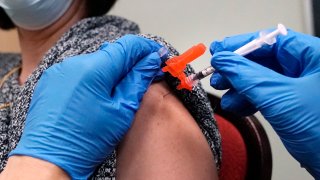
One of the first studies to track whether COVID-19 vaccination might affect women’s periods found a small and temporary change.
Research published Wednesday tracked nearly 4,000 U.S. women through six menstrual cycles and on average, the next period after a shot started about a day later than usual. But there was no change in the number of days of menstrual bleeding after COVID-19 vaccination.
“This is incredibly reassuring,” said Dr. Alison Edelman of Oregon Health & Science University, who led the research and said it's important to tell women what to expect.
Some women have reported irregular periods or other menstrual changes after their shots. The National Institutes of Health is funding studies to examine if there’s any link.
Get top local stories in DFW delivered to you every morning. >Sign up for NBC DFW's News Headlines newsletter.
Edelman’s team analyzed data from a birth control app called Natural Cycles, cleared by the Food and Drug Administration for women to track their menstrual cycles and tell when they’re most likely to become pregnant.
Menstrual cycles are counted from the first day of one period to the first day of the next. Slight variations from month to month are normal, and stress, diet, even exercise can spur temporary changes.
Edelman said the study included women with “the most normal of normal” cycle length, averaging between 24 and 38 days. Researchers tracked vaccinated women for three cycles before the shots and the immediate three cycles after, including the months they received a dose -- and compared them to unvaccinated women. The app prompted women to enter vaccine information.
Coronavirus Pandemic
Full coverage of the COVID-19 outbreak and how it impacts you
A subset of 358 women who got both vaccine doses in the same menstrual cycle saw a slightly larger change to their next cycle length, on average two days. About 10% of them had a change of eight days or more, but subsequently returned to normal ranges, the researchers reported in the journal Obstetrics & Gynecology.
Edelman said one theory is that when the immune system revs up at certain times in the cycle, “our body clock or what controls the menstrual cycle can have a hiccup.”
She plans additional study to tell if there are changes in the heaviness of menstrual bleeding or if women who have irregular periods react differently.
The findings provide “important new evidence underscoring that any impact of the COVID vaccines on menstruation is both minimal and temporary,” Dr. Christopher Zahn of the American College of Obstetricians and Gynecologists said in a statement.
___
The Associated Press Health and Science Department receives support from the Howard Hughes Medical Institute’s Department of Science Education. The AP is solely responsible for all content.


